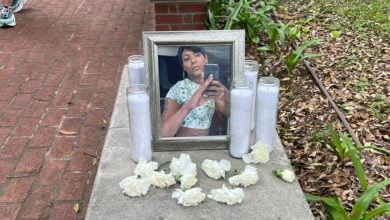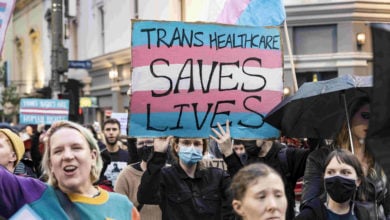On June 6, organizers and activists rallied in front of the Metropolitan Detention Center in Downtown Los Angeles in remembrance of Roxsana Hernández, a Honduran trans woman who died at the hands of Customs and Border Patrol and Immigration and Customs Enforcement in detention in late May. Parallel actions demanding #JusticeforRoxsana took place in Sacramento, San Francisco, New York, Philadelphia, Phoenix, Albuquerque, Atlanta, Houston, Phoenix, Tucson, Oregon, Mexico City, and Tijuana on the same day. The transnational demonstrations were organized largely by Familia: Trans Queer Liberation Movement, an organization that has gained recognition both for staging militant actions and for building bridges between different parts of the immigrant community.
On May 9, when Hernández arrived in the U.S. and asked for asylum, CBP detained her in inhumane conditions. International and domestic human rights organizations have reported pervasive sexual and physical violence, restricted access to life-saving medical care and other dehumanizing treatment in such immigration detention centers. On the May 16, Roxsana was transferred to the ICE Cibola County Correctional Center, and she passed away on May 25 due to the violently negligent treatment she received from both CBP and ICE.
Jennicet Gutierrez, one of the principal organizers of Familia, began the rally by tying in the violence that Hernández experienced with the violence that killed Claudia Gómez González, a 19-year-old immigrant from Guatemala who was shot dead by CBP officials just two weeks ago, and thousands more undocumented immigrants. Both women had their lives cut
short by border authorities that continue to terrorize immigrant lives without accountability.
The rally hit a particularly emotional point when Nakay Flotte, an organizer who personally knew Roxsana Hernández, spoke about her memories of Hernández. Nakay is an organizer with Diversidad Sin Fronteras, a contingent of trans and queer refugees on the mostly Central American caravan that passed through Mexico to the U.S., where they sought asylum. She spoke about Hernández as a warm and compassionate human being who would often share her make-up with her trans sisters. This passionate remembrance reminded all the participants of the rally that the impacts of the violence of ICE and CBP are far more than statistics – these agencies’ employees have [on official record] killed over 97 people since 2003 – they are human lives.
Others who spoke at the rally included another member of Familia, Gretta Soto Moreno, who had first-hand experience of what she called “900 days of hell” in ICE detention, and John Prysner, a member of ANSWER Coalition. The rally ended with more calls to action; Familia organizers had been in contact with Hernández’s family, who hoped to be able to mourn properly and transport their sister’s body back to Honduras. Repatriating bodies is a needlessly expensive process, and those who want to help can donate to the cause here. The organizers also reminded participants that there are dozens of trans women still in detention in ICE, including many of the people from the caravan Hernández traveled with to the United States. Guttierez in closing the rally encouraged everybody that the fight for trans liberation had to be placed at the center of any project aiming on changing the world and towards achieving liberation and social justice for all.





